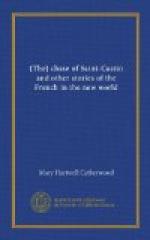Saint-Castin was a good hunter. He had more than once watched a slim young doe stand gazing curiously at him, and had not startled it by a breath. Therefore he was able to become a stump behind the tree which Madockawando’s daughter sought with her sap pail. Usually he wore buckskins, in the free and easy life of Pentegoet. But he had put on his Carignan-Salieres uniform, filling its boyish outlines with his full man’s figure. He would not on any account have had La Hontan see him thus gathering the light of the open woods on military finery. He felt ashamed of returning to it, and could not account for his own impulses; and when he saw Madockawando’s daughter walking unconsciously toward him as toward a trap, he drew his bright surfaces entirely behind the column of the tree.
She had taken no part in this festival of labor for several years. She moved among the women still in solitude, not one of them feeling at liberty to draw near her except as she encouraged them. The Abenaquis were not a polygamous tribe, but they enjoyed the freedom of the woods. Squaws who had made several experimental marriages since this young celibate began her course naturally felt rebuked by her standards, and preferred stirring kettles to meeting her. It was not so long since the princess had been a hoiden among them, abounding in the life which rushes to extravagant action. Her juvenile whoops scared the birds. She rode astride of saplings, and played pranks on solemn old warriors and the medicine-man. Her body grew into suppleness and beauty. As for her spirit, the women of the tribe knew very little about it. They saw none of her struggles. In childhood she was ashamed of the finer nature whose wants found no answer in her world. It was anguish to look into the faces of her kindred and friends as into the faces of hounds who live, it is true, but a lower life, made up of chasing and eating. She wondered why she was created different from them. A loyalty of race constrained her sometimes to imitate them; but it was imitation; she could not be a savage. Then Father Petit came, preceding Saint-Castin, and set up his altar and built his chapel. The Abenaqui girl was converted as soon as she looked in at the door and saw the gracious image of Mary lifted up to be her pattern of womanhood. Those silent and terrible days, when she lost interest in the bustle of living, and felt an awful homesickness for some unknown good, passed entirely away. Religion opened an invisible world. She sprang toward it, lying on the wings of her spirit and gazing forever above. The minutest observances of the Church were learned with an exactness which delighted a priest who had not too many encouragements. Finally, she begged her father to let her make a winter retreat to some place near the headwaters of the Penobscot. When the hunters were abroad, it did them no harm to remember there was a maid in a wilderness cloister praying for the good of her people; and when they were fortunate, they believed in the material advantage of her prayers. Nobody thought of searching out her hidden cell, or of asking the big-legged hunter and his wife to tell its mysteries. The dealer with invisible spirits commanded respect in Indian minds before the priest came.




